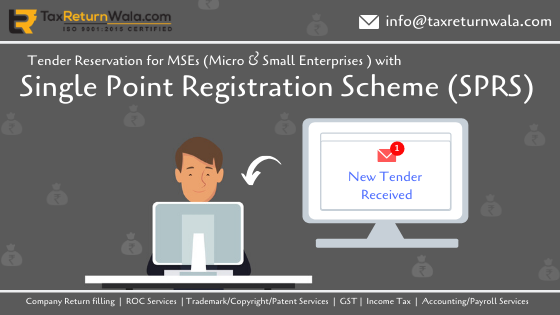Tender Reservation for MSE under Single Point Registration Scheme (SPRS)
National Small Industries Corporation (“NSIC”) is an enterprise owned and controlled by the Government of India under its department of Ministry of Micro, Small and Medium Enterprises (“MSMEs”) assures preparation and implementation of policies required for the growth and development of Small Industries and all microenterprises listed under Micro, Small and Medium Enterprises.
Out of other numerous benefiting schemes for MSEs, the Single Point Registration Scheme (SPRS) was introduced. The scheme aims at reducing the effort of the government in procuring supplies for its departments and promotes the growth of small entities with bulk purchase contracts and tenders.
The below write up guides you all about the eligibility, process and the key benefits of registering your business under the SPRS Scheme.
Overview of SPRS Scheme
In a survey conducted, it was found that the government is the largest procurer of goods from the private sector. There is always a constant demand for supplies from the government for its departments.
To increase the purchase requirement further in 1955-56, the Government Stores Purchase Program was launched. In 2003, to simplify the processing of tenders and ease the procuring business of government, NSIC launched the Single Point Registration Scheme for MSEs to supply their produce to the government with assured returns and low cost of tenders.
Registration under SPRS
Who can register under this scheme?
The following entities are permitted to register the SPRS Scheme.
- All Micro and Small Enterprises (“MSEs”) having Udyog Aadhaar Registration (“UAM”) or EM (Enterprise Memorandum).
- All MSEs who has started the commercial production of their respective goods even if they had not completed their one year of incorporation.
- All MSEs engaged in the business of manufacturing or Services registered under their respective Director of Industries (“DI”) or District Industries Centre (“DIC”).
Note: Traders are not eligible for the Scheme.
What Documents are required for Registration?
The documents required for registration under SPRS Scheme, depending on the production capacity of the plant, link of proprietor with larger units and several other factors are as follows:
- Declaration of having made an entry in MSME Data Bank.
- Scanned Self-attested copy of PAN.
- Udyog Adhaar Memorandum (UAM) Certificate.
- Proof of Ownership of Plant & Machinery/Equipment & Tools and Raw Material showing a date/year of purchase & Original Purchase value (Not Depreciated) of individual machinery.
- Performance Statement as per Performa Annexure-F of the application.
- Self-attested copy of ownership documents of the premises or copy of lease deed.
- Certificate from the Proprietor/Partner/Directors whether or not they have any link with large scale Unit(s).
Additional documents may vary in case of different forms of business
How to Register under SPRS Scheme?
Online Process:
To register under the SPRS Scheme for MSEs, the promoter of business has to undergo a three-step online process:
Step 1: Visit http://www.nsicspronline.com/home.aspx and click on ‘Apply Now’.
Step 2: Fill in the business details and Upload the necessary documents as required in the SPRS Registration form shown on the website or contact the NSIC helpdesk for help.
Step 3: Click on ‘Register’ and pay the required fees.
After submission of the online form, the original documents have to be submitted and get verified from to the nearest NSIC branch or authority notified. On successful registration, the branch will issue the SPRS Registration Certificate to the MSE.
Offline Process:
Step 1: Locating the nearest Zonal/ Branch and sub- Office / Extension Office of NSIC.
Step 2: Filing up the application in duplicate and submit with the nearest zonal office or as the case may e.
Step 3: Forwarding of Application to the concerned MSME – DI Rites / DCD along with documents and fee as prescribed.
Step 4: Inspection by the concerned officer and forward their recommendations.
Step 5: Post receiving the inspection report from the MSME- DI inspection Report, NSIC will issue the Registration Certificate.
What terms & conditions are linked to SPRS Registration?
- The registration granted to an MSE shall be made available with an expiry period of 2 years and which have to be renewed by the MSE from NSIC.
- The Provisional certificate shall be granted to the MSE with a monetary limit of Rs 5 lakhs which shall be valid for one year to those who have already commenced production without having the existence of business over 1 year.
- The monetary limit of other firms shall be calculated based on the net sales turnover of business projected by the promoters in their Audited Balance Sheets.
- A list of products to be procured reserved for MSEs can be accessed here – https://www.nsic.co.in/pdfs/listof358itemsreserved.pdf.
Benefits of registration under SPRS Scheme for MSEs
On receipt of SPRS registration, the MSEs become eligible to avail the following benefits:
- Issue of tenders with absolutely no cost of application: MSEs under SPRS Scheme shall be able to participate and access tender sets for free with no application cost involved.
- Exemption from payment of Earnest Money: MSEs under SPRS Scheme shall be allowed to access tenders applications without making payment of any Earnest Money Deposits (EMD).
- Charge of L1 Price: For registered MSEs under SPRS Scheme quoting price under the L1 price + 15% shall be allowed to supply a portion up to 25% of the requirement by bringing down the price to L1 where L1 is non-MSE.
- Reserved purchase quota from registered MSEs: The scheme assures a minimum goal of 25% of Central Ministries /Departments and purchases for PSUs to be made through MSEs. Out of 25%, 4% has been earmarked for MSEs owned by SCs and STs and 3% for Women Entrepreneurs.
Know about all benefitting schemes for your MSME Unit from our business expert.
Reach us at info@taxreturnwala.com
Also Read: Debt Restructuring Scheme for MSME


